Jailed British Ahmadi Masood Ahmad in Pakistan blasphemy appeal
- Published
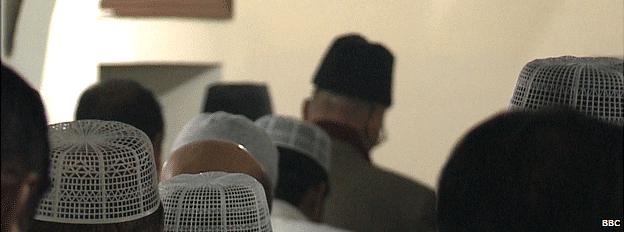
Ahmadis are increasingly being persecuted under Pakistan's laws, activists say
A British man of the minority Ahmadi sect is appealing to the UK for help after being jailed in Pakistan on blasphemy charges. Human rights activists say laws in Pakistan, where Ahmadis are considered heretics, are being increasingly used to persecute the community, as the BBC's Saba Eitizaz reports.
It was a home video that turned a man viewed as the old neighbourhood doctor into a prisoner without bail.
Masood Ahmad shuffles through the dank prison corridor, smiling when he greets me. He looks weak and speaks little. And he worries - but not for his freedom.
"I just want you to tell my children that I am fine. It grieves me more that they must be so worried."
He asks me to convey this message to his seven children living in Britain and Australia.
Last month Mr Ahmad, 72, was arrested at his homeopathic clinic in Lahore on blasphemy charges.
Two people posing as patients came to him for treatment and had a conversation about religion instead.
They used mobile phones to secretly film him reciting a verse from the Koran, and then called the police to have him arrested.
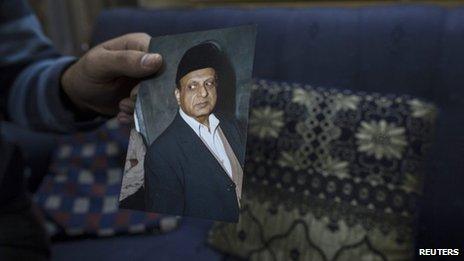
Masood Ahmad says he felt "marked", but didn't see his arrest coming
The homeopathy practitioner belongs to the Ahmadi minority sect that a large number of Pakistanis view with suspicion because of a law declaring them to be non-Muslims.
Ahmadis, whose holy book is also the Koran, believe their own founder, Mirza Ghulam Ahmad, was a prophet, which most Muslims say contradicts mainstream Islamic teaching.
Ahmadis can be jailed for up to three years in Pakistan for "behaving like Muslims", having Muslim names or using Islamic terms for their places of worship or religious rituals.
Human rights activists say the law , externalis now being used to push the Ahmadi community into a legal corner by right-wing religious groups in Pakistan. They are also open targets for sectarian violence by extremists.
"When you formalise persecution of minorities, you should expect extremist elements to take advantage of that, because that is what they thrive on," says human rights lawyer Asma Jehangir, who has raised the issue at several international forums.
Masood Ahmad says he felt "marked" even before he was picked up.
"Somebody had painted a black mark on my car and outside my house a few weeks before I was arrested, so I knew I was being watched."
He still did not see his arrest coming. After all, he had lived in the old neighbourhood of Anarkali since the late 1980s and had close ties with the community.
He is a Pakistani-British dual national who says he returned with a desire to raise his children with Pakistani values and to help people through his medicine.
According to police sources, almost 10 of his neighbours gave eyewitness testimony against him for preaching his faith.
He tells me that many of them also came to see him in jail, concerned for his wellbeing.
"I do not partake in religious debate. I am a doctor, a professional," he says.
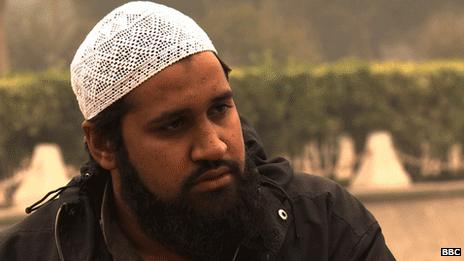
Mohammad Hasan Moawwiya says what he is doing is in line with the law
The official complaint registered is in the name of a local cleric who refused to speak to the BBC - but the phone number on it was traced to an activist called Mohammad Hasan Moawwiya, whose name appears in several similar cases against Ahmadis.
He is associated with an emerging group called The Khattam-e-Nabuwwat Lawyer's Forum - an extended legal wing of Khattam-e-Nabuwwat - a right-wing religious group that has also been associated with distributing hate literature and actively campaigning against the Ahmadiyya community in the past.
Mr Moawwiya says it is his legal and constitutional right to do so.
"After the law of 1984 was made, it doesn't mean that it should be neglected, it should be implemented actively," he says. "They [Ahmadis] should name their religion and names as separate to us Muslims, otherwise it's a violation and we are allowed by the law of the country to carry on our work."
However, huge mobs were reported outside the police station when Mr Ahmad was arrested, chanting "Be Qadri! Be Qadri!"
This was a reference to Mumtaz Qadri, the bodyguard of former Punjab Governor Salman Taseer who he killed for speaking out against the blasphemy laws in 2011. He is currently in jail but revered by many.
"The danger is not inside jail, the danger to me is outside," says Mr Ahmad, who is being kept under tight security in Lahore's District Jail.
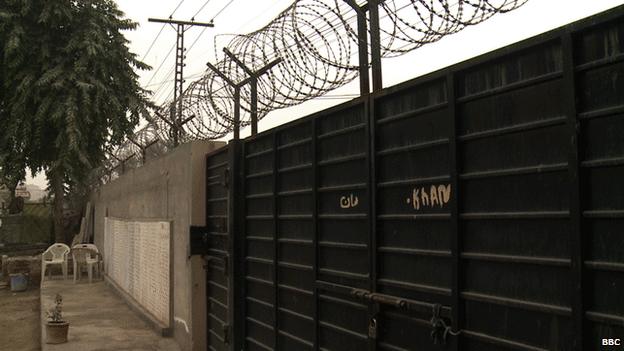
Ahmadis now worship and remember their dead behind high walls and barbed wire
The same angry crowds are seen at every court hearing and Mr Ahmad fears the judges may feel pressurised while reaching a verdict. His lawyers have applied for bail twice, due to his old age and illness - but their attempts have failed. The court has cited "insufficient grounds for bail".
Mr Ahmed is now appealing to the British High Commission. "Have I killed or robbed anyone? I request the British government to help me ensure a fair trial. That is all I ask."
His daughter in Australia, Sophia Ahmad, says she is corresponding with the British High Commission and international legal charities to help her father.
"He is recovering from cancer, he is sick and needs medication. We are very worried for him," she told the BBC in Skype conversation.
According to Ahmadi groups, more than 20 cases have been registered against Ahmadis this year alone.
Many others remain in jail.
Another member of the community, Faisal, is still waiting for his 60-year-old father's release after he was jailed earlier this year for reading an Ahmadi newspaper.
The complaint was filed by Mohammad Hasan Moawwiya.
Faisal prays for his father at the Ahmadi mosque in Lahore that was violently attacked by militants with grenades and guns in 2010, killing more than 80 people.
Two of the gunmen arrested at the scene have still not been convicted.
The mosque now resembles an army barracks, with concrete blockades and volunteers from the community patrolling the area at Friday prayer time, shotguns and walkie-talkies at their sides, in order to protect worshippers.
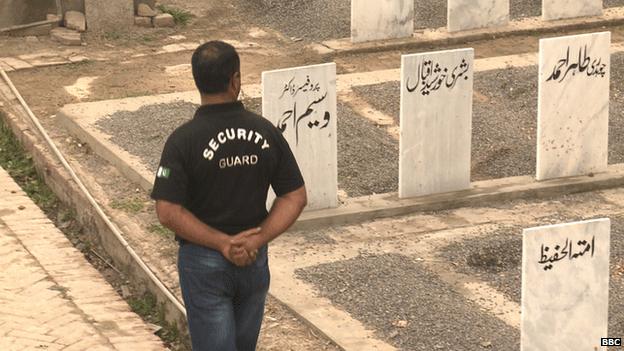
These Ahmadi graves survived this year's attack - many others were desecrated
Close by is the Ahmadi graveyard, but you cannot tell from the outside.
High walls and barbed wire are all you can see, as well as a sniper on the rooftop.
Earlier this year, the entire western portion of the graveyard was destroyed by gunmen who broke through the walls, demolishing many gravestones.
Now a fortress has been built to protect the Ahmadi dead.
Meanwhile, Masood Ahmad waits for his verdict.
"I used to read about minorities being targeted in the newspapers," he says. "Now I'm in the news."
- Published31 August 2013
- Published14 January 2011
- Published29 May 2010
- Published29 May 2010